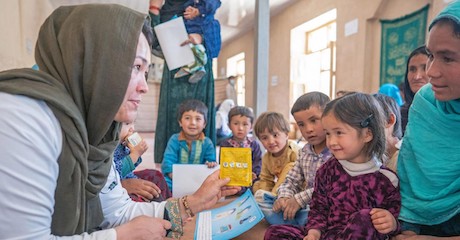Stay informed on UNICEF’s work saving and protecting children around the world
UUSA-185 Entrance Modal
Submitted by todemko on
Since January of this year, 29 countries have had outbreaks of cholera — the most at any one time on record, and including places that have not seen a single case of the highly-infectious waterborne disease for decades.
In Haiti and Malawi, Lebanon, Syria and elsewhere, UNICEF is rushing supplies for treatment and ramping up prevention efforts with partners on the ground.
These activities includes strengthening sanitation systems and hygiene practices at the household and community level, focusing on areas already experiencing an outbreak and those at high risk.
A young child is treated for cholera symptoms at a UNICEF-supported facility in Port-au-Prince, Haiti, on Oct. 14, 2022. © UNICEF/UN0721018/Joseph
Cholera is a bacterial infection spread through contaminated food and water. It can lead to acute watery diarrhea, which can lead to severe dehydration.
The disease is both preventable and treatable; regular handwashing and consistent access to safe water for drinking, cooking and personal hygiene keeps the disease at bay. Outbreaks tend to occur in places where water and sanitation systems are weak or poorly managed, where poverty persists, and where families are displaced due to conflict and climate change.
When there is flooding, and safe water supplies are disrupted, risks multiply as families and their children turn to unsafe water sources — which is why containing and preventing cholera is a priority for emergency teams responding to needs in flood-impacted areas of Pakistan, Nigeria and the Democratic Republic of the Congo.
It is also a priority for UNICEF and partners on the ground in the Horn of Africa and Sahel region, where severe drought has caused widespread displacement and soaring rates of malnutrition in children. Malnourished children who are exposed to cholera are more vulnerable to developing severe cholera disease, which can be fatal. Managing cholera cases and containing an outbreak is a huge burden for already overstretched health care systems.
Two-year-old Gladys and her mother Mary access safe water outside a UNICEF-supported facility in rural Chilumbra, Karonga district, northern Malawi, as another member of the community looks on. © UNICEF/UN0711213
Bertrand Bainvel, UNICEF Deputy Regional Director for the Middle East and North Africa, recently urged support for swift again to curb cholera outbreaks in Syria and Lebanon.
“The risks of the disease further spreading to other countries in the region call for immediate action,” he said. In Syria alone, there were 20,000 suspected cases of acute watery diarrhea and 75 cholera-associated deaths as of Oct. 24.
Children staying at a UNICEF-supported shelter for displaced families in the Ghwayran neighborhood of Hasakah city, northeast Syria, where community volunteers have been trained by UNICEF to help implement cholera prevention measures. Volunteers also help test chlorine levels and use aqua tabs to purify water for household use. UNICEF has reached tens of thousands of people in Hasakah and Al-Raqqah governorates in northeast Syria with awareness raising activities, including home visits, meetings with community leaders, counseling sessions with caregivers and recreational sessions with children. Key messages were also disseminated through WhatsApp groups and Facebook pages and to more than 450 mosques. © UNICEF/UN0715226/Souleiman
UNICEF helps countries fight cholera by:
- procuring and distributing items such as acute watery diarrhea treatment kits to hospitals and health centers and water purification tablets to households
- provides strategic technical support and guidance to governments and other local partners in outbreak prevention, preparedness and response
- coordinates with the World Health Organization and other agencies on disease surveillance, service delivery and other activities
- supporting public awareness campaigns focused on prevention
- working with partners to advance long-term, climate-resilient solutions to water scarcity
Combatting cholera — and preventing child deaths from cholera — requires an integrated approach across multiple UNICEF programs, including health, water, sanitation and hygiene (WASH), nutrition, education, protection and other sectors as well as services for communication, emergency operations and supply management.
Support UNICEF efforts to protect vulnerable children and families from cholera and other preventable diseases. Donate today.
Top photo: Fatima Adeli, a doctor with a UNICEF-supported mobile health and nutrition team, attends to patients in Safeedi-Mish village in the Nili district of Daikundi Province, central Afghanistan, on Oct. 3, 2022. The roving mobile health and nutrition team provides a lifeline to inaccessible communities who would otherwise be unable to visit health clinics. “Most of the cases I see are for flu and throat diseases — there’s a lot of cholera too, and, as a mother, it makes me feel sad,” Dr. Adeli says. “Because I have lots of drugs here and can easily treat the children, I go from being very sad to quickly being happy again as I know my patients will get better. I always have a good night’s sleep at the end of a very long day.” © UNICEF/UN0733566/Naftalin
